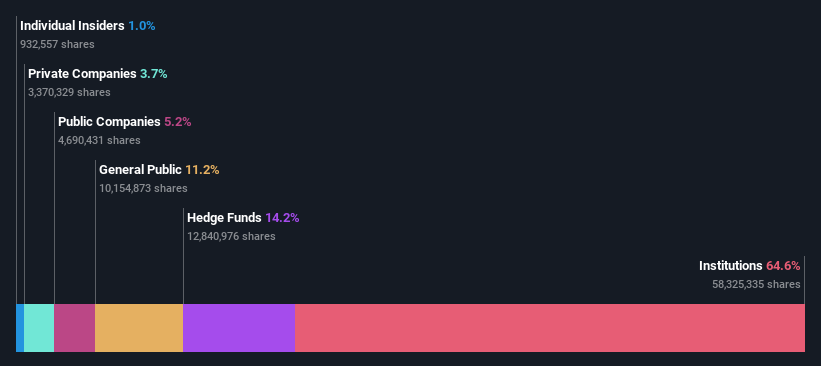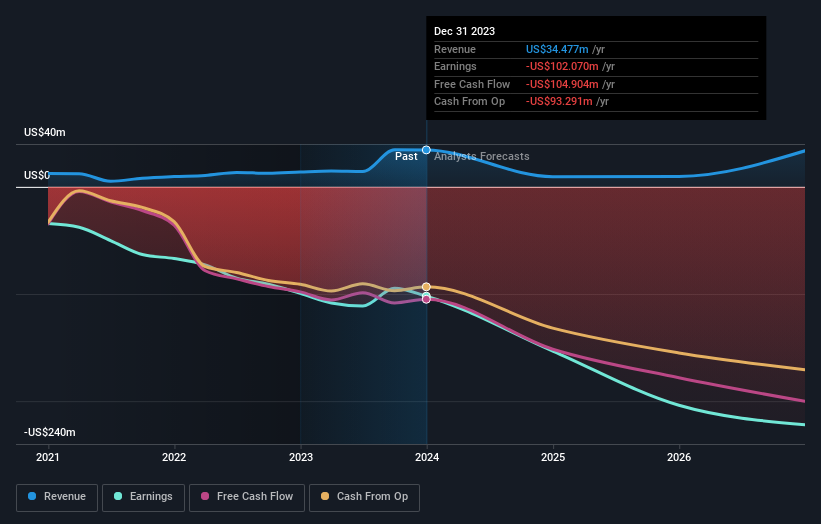With 65% institutional ownership, Caribou Biosciences, Inc. (NASDAQ:CRBU) is a favorite amongst the big guns
Key Insights
Institutions' substantial holdings in Caribou Biosciences implies that they have significant influence over the company's share price
52% of the business is held by the top 10 shareholders
Analyst forecasts along with ownership data serve to give a strong idea about prospects for a business
A look at the shareholders of Caribou Biosciences, Inc. (NASDAQ:CRBU) can tell us which group is most powerful. The group holding the most number of shares in the company, around 65% to be precise, is institutions. In other words, the group stands to gain the most (or lose the most) from their investment into the company.
Given the vast amount of money and research capacities at their disposal, institutional ownership tends to carry a lot of weight, especially with individual investors. As a result, a sizeable amount of institutional money invested in a firm is generally viewed as a positive attribute.
Let's take a closer look to see what the different types of shareholders can tell us about Caribou Biosciences.
View our latest analysis for Caribou Biosciences
What Does The Institutional Ownership Tell Us About Caribou Biosciences?
Institutions typically measure themselves against a benchmark when reporting to their own investors, so they often become more enthusiastic about a stock once it's included in a major index. We would expect most companies to have some institutions on the register, especially if they are growing.
Caribou Biosciences already has institutions on the share registry. Indeed, they own a respectable stake in the company. This implies the analysts working for those institutions have looked at the stock and they like it. But just like anyone else, they could be wrong. It is not uncommon to see a big share price drop if two large institutional investors try to sell out of a stock at the same time. So it is worth checking the past earnings trajectory of Caribou Biosciences, (below). Of course, keep in mind that there are other factors to consider, too.
Investors should note that institutions actually own more than half the company, so they can collectively wield significant power. It looks like hedge funds own 14% of Caribou Biosciences shares. That catches my attention because hedge funds sometimes try to influence management, or bring about changes that will create near term value for shareholders. Looking at our data, we can see that the largest shareholder is BlackRock, Inc. with 7.8% of shares outstanding. PFM Health Sciences, LP is the second largest shareholder owning 7.2% of common stock, and Avidity Partners Management, L.P. holds about 7.0% of the company stock.
We also observed that the top 10 shareholders account for more than half of the share register, with a few smaller shareholders to balance the interests of the larger ones to a certain extent.
Researching institutional ownership is a good way to gauge and filter a stock's expected performance. The same can be achieved by studying analyst sentiments. There are plenty of analysts covering the stock, so it might be worth seeing what they are forecasting, too.
Insider Ownership Of Caribou Biosciences
The definition of company insiders can be subjective and does vary between jurisdictions. Our data reflects individual insiders, capturing board members at the very least. Company management run the business, but the CEO will answer to the board, even if he or she is a member of it.
Insider ownership is positive when it signals leadership are thinking like the true owners of the company. However, high insider ownership can also give immense power to a small group within the company. This can be negative in some circumstances.
We can see that insiders own shares in Caribou Biosciences, Inc.. In their own names, insiders own US$4.8m worth of stock in the US$464m company. It is good to see some investment by insiders, but it might be worth checking if those insiders have been buying.
General Public Ownership
With a 11% ownership, the general public, mostly comprising of individual investors, have some degree of sway over Caribou Biosciences. This size of ownership, while considerable, may not be enough to change company policy if the decision is not in sync with other large shareholders.
Private Company Ownership
It seems that Private Companies own 3.7%, of the Caribou Biosciences stock. It might be worth looking deeper into this. If related parties, such as insiders, have an interest in one of these private companies, that should be disclosed in the annual report. Private companies may also have a strategic interest in the company.
Public Company Ownership
Public companies currently own 5.2% of Caribou Biosciences stock. We can't be certain but it is quite possible this is a strategic stake. The businesses may be similar, or work together.
Next Steps:
It's always worth thinking about the different groups who own shares in a company. But to understand Caribou Biosciences better, we need to consider many other factors. To that end, you should learn about the 4 warning signs we've spotted with Caribou Biosciences (including 1 which is significant) .
If you are like me, you may want to think about whether this company will grow or shrink. Luckily, you can check this free report showing analyst forecasts for its future.
NB: Figures in this article are calculated using data from the last twelve months, which refer to the 12-month period ending on the last date of the month the financial statement is dated. This may not be consistent with full year annual report figures.
Have feedback on this article? Concerned about the content? Get in touch with us directly. Alternatively, email editorial-team (at) simplywallst.com.
This article by Simply Wall St is general in nature. We provide commentary based on historical data and analyst forecasts only using an unbiased methodology and our articles are not intended to be financial advice. It does not constitute a recommendation to buy or sell any stock, and does not take account of your objectives, or your financial situation. We aim to bring you long-term focused analysis driven by fundamental data. Note that our analysis may not factor in the latest price-sensitive company announcements or qualitative material. Simply Wall St has no position in any stocks mentioned.

 Yahoo Finance
Yahoo Finance 

